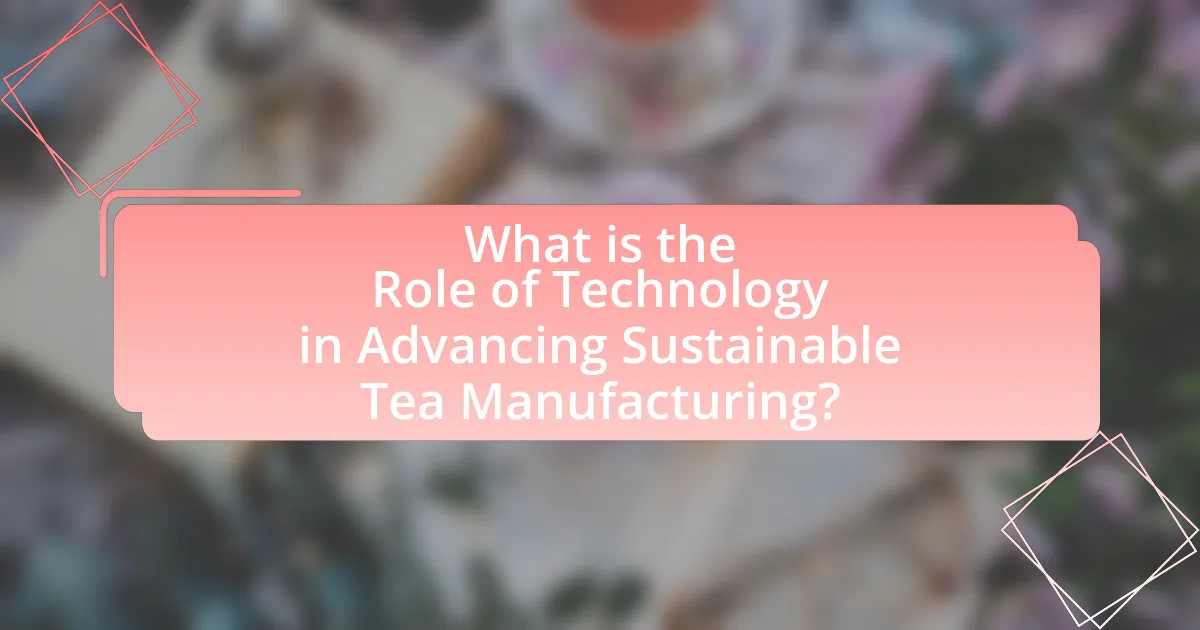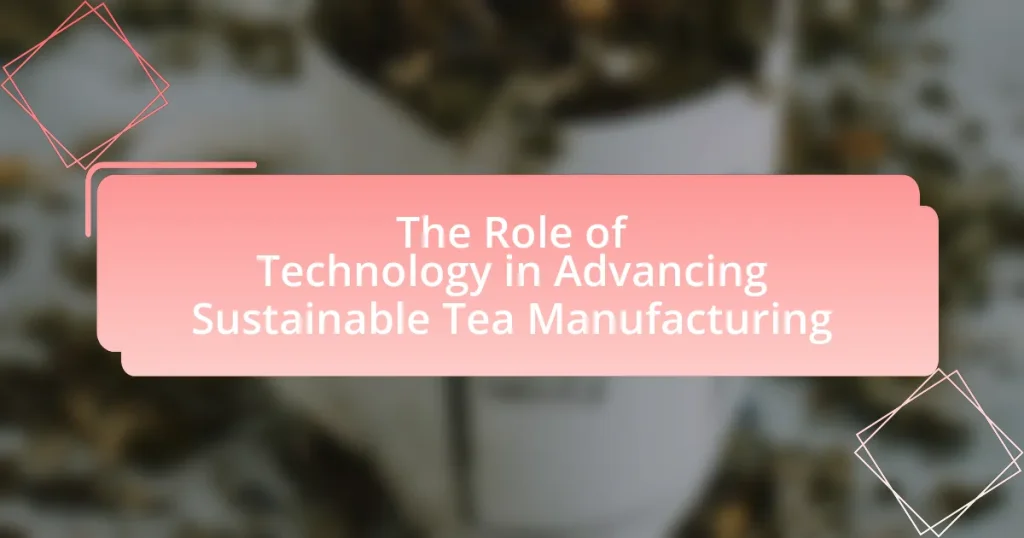The article focuses on the role of technology in advancing sustainable tea manufacturing, highlighting how innovations enhance efficiency, reduce waste, and promote environmentally friendly practices. Key technologies discussed include precision agriculture, renewable energy systems, and automation, which collectively optimize resource use and minimize environmental impact. The article also addresses the challenges faced by traditional tea manufacturing, such as deforestation and pesticide use, while emphasizing the benefits of sustainable practices for local communities and ecosystems. Furthermore, it explores future trends in technology and consumer demand that are expected to drive advancements in sustainable tea production.

What is the Role of Technology in Advancing Sustainable Tea Manufacturing?
Technology plays a crucial role in advancing sustainable tea manufacturing by enhancing efficiency, reducing waste, and promoting environmentally friendly practices. For instance, precision agriculture technologies, such as drones and soil sensors, enable farmers to monitor crop health and optimize resource use, leading to reduced pesticide and water consumption. Additionally, innovations in processing techniques, like energy-efficient machinery and waste recycling systems, minimize the carbon footprint of tea production. According to a study published in the Journal of Cleaner Production, implementing these technologies can decrease energy use by up to 30% in tea processing facilities, demonstrating their effectiveness in promoting sustainability.
How does technology contribute to sustainability in tea production?
Technology enhances sustainability in tea production by optimizing resource use and reducing environmental impact. Precision agriculture techniques, such as soil moisture sensors and satellite imagery, enable farmers to apply water and fertilizers more efficiently, minimizing waste and runoff. Additionally, innovations like automated harvesting and processing machinery improve labor efficiency and reduce energy consumption. Research indicates that these technologies can lead to a 20-30% reduction in water usage and a significant decrease in chemical inputs, promoting healthier ecosystems. Furthermore, blockchain technology enhances traceability in the supply chain, ensuring ethical sourcing and reducing fraud, which supports sustainable practices.
What specific technologies are being utilized in sustainable tea manufacturing?
Sustainable tea manufacturing utilizes technologies such as precision agriculture, renewable energy systems, and water management technologies. Precision agriculture employs data analytics and IoT sensors to optimize resource use, reducing waste and enhancing crop yields. Renewable energy systems, including solar panels and biogas digesters, provide clean energy for processing facilities, minimizing carbon footprints. Water management technologies, such as drip irrigation and rainwater harvesting systems, ensure efficient water use, crucial in regions facing water scarcity. These technologies collectively contribute to environmentally friendly practices in the tea industry, promoting sustainability and resource conservation.
How do these technologies reduce environmental impact?
Technologies in sustainable tea manufacturing reduce environmental impact by optimizing resource use and minimizing waste. For instance, precision agriculture technologies enable farmers to apply water, fertilizers, and pesticides more efficiently, which can lead to a reduction in chemical runoff and water usage by up to 30%. Additionally, renewable energy sources, such as solar and wind, are increasingly used in tea processing facilities, significantly lowering greenhouse gas emissions associated with traditional fossil fuel energy. Furthermore, innovations in packaging, such as biodegradable materials, help decrease plastic waste, contributing to a cleaner environment. These advancements collectively support a more sustainable approach to tea production, aligning with global efforts to mitigate climate change and preserve natural resources.
Why is sustainable tea manufacturing important?
Sustainable tea manufacturing is important because it minimizes environmental impact while promoting social equity and economic viability. This approach reduces deforestation, conserves water, and decreases pesticide use, which collectively contribute to healthier ecosystems. For instance, studies indicate that organic tea farming can reduce chemical runoff by up to 90%, thereby protecting local biodiversity. Additionally, sustainable practices often enhance the livelihoods of tea farmers by ensuring fair wages and improving working conditions, which fosters community resilience. Therefore, sustainable tea manufacturing not only addresses ecological concerns but also supports the well-being of those involved in the tea supply chain.
What are the environmental challenges faced by traditional tea manufacturing?
Traditional tea manufacturing faces several environmental challenges, including deforestation, soil degradation, water scarcity, and pesticide use. Deforestation occurs as land is cleared for tea plantations, leading to habitat loss and biodiversity decline. Soil degradation results from intensive farming practices that strip nutrients and reduce soil fertility. Water scarcity is exacerbated by the high water consumption required for tea cultivation, impacting local water resources. Additionally, the use of pesticides in traditional tea farming can lead to soil and water contamination, affecting ecosystems and human health. These challenges highlight the need for sustainable practices in the tea industry to mitigate environmental impacts.
How does sustainable tea manufacturing benefit local communities?
Sustainable tea manufacturing benefits local communities by promoting economic stability and environmental health. This approach often involves fair trade practices, which ensure that tea farmers receive equitable compensation for their labor, thereby improving their livelihoods. Additionally, sustainable practices reduce the use of harmful pesticides and fertilizers, leading to healthier ecosystems and safer working conditions for local laborers. For instance, a study by the International Institute for Environment and Development found that fair trade tea producers in Kenya saw a 30% increase in income, which directly contributed to community development projects such as schools and healthcare facilities.
What are the key technological innovations in sustainable tea manufacturing?
Key technological innovations in sustainable tea manufacturing include precision agriculture, energy-efficient processing, and waste reduction technologies. Precision agriculture utilizes data analytics and IoT devices to optimize water usage and soil health, leading to higher yields with lower environmental impact. Energy-efficient processing methods, such as solar-powered dryers and biomass energy systems, significantly reduce carbon emissions during production. Additionally, waste reduction technologies, including composting and recycling systems, minimize byproducts and enhance resource efficiency. These innovations collectively contribute to a more sustainable tea industry by improving resource management and reducing ecological footprints.
How does precision agriculture enhance tea cultivation sustainability?
Precision agriculture enhances tea cultivation sustainability by optimizing resource use and minimizing environmental impact. This approach employs technologies such as soil sensors, satellite imagery, and data analytics to monitor and manage tea plantations more efficiently. For instance, precision irrigation systems can reduce water usage by up to 30% while maintaining crop health, thereby conserving water resources. Additionally, targeted application of fertilizers and pesticides minimizes chemical runoff and soil degradation, promoting healthier ecosystems. Studies have shown that farms utilizing precision agriculture techniques can increase yield by 10-20% while reducing input costs, demonstrating a clear link between technology adoption and sustainable practices in tea cultivation.
What role does automation play in sustainable tea processing?
Automation significantly enhances sustainable tea processing by increasing efficiency and reducing waste. Automated systems optimize resource use, such as water and energy, leading to lower environmental impact. For instance, precision irrigation systems minimize water usage by delivering the exact amount needed for tea plants, which can reduce water consumption by up to 30%. Additionally, automation in sorting and packaging reduces manual labor and minimizes the risk of contamination, ensuring higher quality and safety standards. These advancements contribute to a more sustainable production cycle, aligning with global sustainability goals in agriculture.
How can technology improve the quality of sustainably produced tea?
Technology can improve the quality of sustainably produced tea by enhancing agricultural practices, optimizing processing methods, and ensuring better traceability. Precision agriculture technologies, such as drones and soil sensors, allow farmers to monitor crop health and soil conditions, leading to more efficient use of resources and higher quality tea leaves. For instance, the use of data analytics can help identify the optimal time for harvesting, which directly impacts flavor and aroma. Additionally, advancements in processing technologies, like controlled fermentation and drying techniques, can preserve the natural qualities of tea while minimizing waste. Furthermore, blockchain technology can provide transparency in the supply chain, ensuring that sustainably produced tea is traceable from farm to consumer, thereby reinforcing quality assurance.
What methods are used to monitor and enhance tea quality through technology?
Methods used to monitor and enhance tea quality through technology include the application of spectroscopic techniques, remote sensing, and data analytics. Spectroscopic techniques, such as near-infrared spectroscopy, allow for the rapid assessment of chemical composition and quality parameters in tea leaves, enabling producers to make informed decisions during processing. Remote sensing technologies, including drones and satellite imagery, facilitate the monitoring of tea plantations for factors like soil health and moisture levels, which directly impact tea quality. Data analytics, powered by machine learning algorithms, can analyze historical data and predict optimal harvesting times and processing methods, thereby improving overall tea quality. These methods collectively contribute to a more precise and efficient approach to tea production, ensuring higher quality standards are met consistently.
How does technology facilitate traceability in tea supply chains?
Technology facilitates traceability in tea supply chains by enabling real-time tracking of tea products from cultivation to consumption. This is achieved through the use of blockchain technology, which provides a secure and immutable record of each transaction and movement within the supply chain. For instance, companies like TeaTrace utilize QR codes and IoT devices to gather data at various stages, allowing consumers to access detailed information about the origin, processing, and handling of their tea. This transparency not only enhances consumer trust but also helps in identifying and addressing issues related to quality and sustainability, as evidenced by a study from the International Tea Committee, which highlights that traceability systems can reduce fraud and improve compliance with environmental standards.
What are the challenges of implementing technology in sustainable tea manufacturing?
The challenges of implementing technology in sustainable tea manufacturing include high initial costs, lack of technical expertise, and resistance to change among traditional farmers. High initial costs can deter investment in advanced technologies, such as precision agriculture tools and automated processing equipment, which are essential for improving sustainability. Additionally, many tea producers may lack the necessary technical expertise to effectively utilize these technologies, leading to underutilization or ineffective application. Resistance to change is prevalent among traditional farmers who may be hesitant to adopt new practices that disrupt established methods, further complicating the integration of technology into sustainable practices. These challenges collectively hinder the advancement of sustainable tea manufacturing despite the potential benefits of technology.
What barriers do tea producers face in adopting new technologies?
Tea producers face several barriers in adopting new technologies, primarily including high costs, lack of access to financing, and insufficient technical knowledge. High costs associated with new technology can deter producers, especially smallholders, from making investments necessary for modernization. Additionally, many tea producers struggle to secure financing options that would allow them to invest in advanced technologies, limiting their ability to upgrade. Furthermore, a lack of technical knowledge and training on how to effectively implement and utilize new technologies can hinder adoption, as producers may not fully understand the benefits or operational requirements of these innovations. These barriers collectively impede the progress of sustainable tea manufacturing.
How can these challenges be overcome to promote sustainable practices?
To overcome challenges in promoting sustainable practices in tea manufacturing, the integration of advanced technologies such as precision agriculture, data analytics, and renewable energy solutions is essential. Precision agriculture allows for optimized resource use, reducing waste and environmental impact, while data analytics can enhance decision-making by providing insights into crop health and yield predictions. For instance, the use of drones and IoT sensors can monitor soil conditions and plant health in real-time, leading to more efficient water and fertilizer usage. Additionally, implementing renewable energy sources, such as solar panels in processing facilities, can significantly lower carbon emissions associated with traditional energy consumption. These technological advancements not only improve sustainability but also enhance productivity and profitability in the tea industry.
What future trends can we expect in technology and sustainable tea manufacturing?
Future trends in technology and sustainable tea manufacturing include the increased use of precision agriculture, automation, and blockchain technology. Precision agriculture utilizes data analytics and IoT devices to optimize resource use, leading to reduced waste and improved crop yields. Automation in processing facilities enhances efficiency and minimizes labor costs while maintaining quality. Blockchain technology ensures transparency in the supply chain, allowing consumers to trace the origin of their tea and verify sustainable practices. These trends are supported by the growing demand for eco-friendly products and advancements in agricultural technology, which are projected to drive innovation in the tea industry.
How might emerging technologies shape the future of tea production?
Emerging technologies will significantly shape the future of tea production by enhancing efficiency, sustainability, and quality. Innovations such as precision agriculture, which utilizes sensors and data analytics, allow farmers to monitor soil health and optimize water usage, leading to reduced waste and improved crop yields. For instance, the use of drones for aerial imaging can identify pest infestations early, enabling targeted interventions that minimize pesticide use. Additionally, blockchain technology can improve traceability in the supply chain, ensuring that consumers have access to information about the origin and sustainability of their tea. These advancements not only promote environmentally friendly practices but also meet the growing consumer demand for transparency and quality in food production.
What role will consumer demand play in driving technological advancements?
Consumer demand will significantly drive technological advancements by influencing the development and adoption of sustainable practices in tea manufacturing. As consumers increasingly prioritize sustainability, manufacturers are compelled to innovate and implement technologies that reduce environmental impact, such as precision agriculture and energy-efficient processing methods. For instance, a 2021 survey by the International Tea Committee revealed that 70% of consumers are willing to pay more for sustainably produced tea, prompting companies to invest in technologies that enhance sustainability. This shift in consumer preferences not only accelerates technological innovation but also fosters a competitive market focused on eco-friendly practices.
What best practices can tea manufacturers adopt for sustainable technology integration?
Tea manufacturers can adopt several best practices for sustainable technology integration, including implementing precision agriculture techniques, utilizing renewable energy sources, and adopting eco-friendly packaging solutions. Precision agriculture, which employs data analytics and IoT devices, allows manufacturers to optimize water usage and reduce chemical inputs, leading to more sustainable farming practices. The use of renewable energy, such as solar or wind power, can significantly decrease the carbon footprint associated with tea production. Additionally, eco-friendly packaging, such as biodegradable materials, minimizes environmental impact and aligns with consumer preferences for sustainability. These practices not only enhance sustainability but also improve operational efficiency and market competitiveness.


